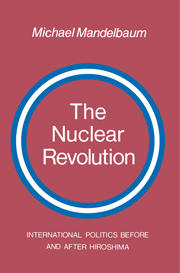Crossref Citations
This Book has been
cited by the following publications. This list is generated based on data provided by Crossref.
Snyder, Glenn H.
1984.
The Security Dilemma in Alliance Politics.
World Politics,
Vol. 36,
Issue. 4,
p.
461.
Buzan, Barry
1984.
Peace, Power, and Security: Contending Concepts in the Study of International Relations.
Journal of Peace Research,
Vol. 21,
Issue. 2,
p.
109.
Reynolds, David
1989.
Power, Wealth and War in the Modern World.
The Historical Journal,
Vol. 32,
Issue. 2,
p.
475.
Poggi, Gianfranco
1991.
LO STATO SFIDATO.
Italian Political Science Review/Rivista Italiana di Scienza Politica,
Vol. 21,
Issue. 2,
p.
191.
Poggi, Gianfranco
1991.
LO STATO SFIDATO.
Italian Political Science Review/Rivista Italiana di Scienza Politica,
Vol. 21,
Issue. 2,
p.
191.
Snyder, Glenn H.
1991.
Alliances, balance, and stability.
International Organization,
Vol. 45,
Issue. 1,
p.
121.
Gaddis, John Lewis
1992.
Nuclear Weapons in the Changing World.
p.
15.
Orme, John D.
1992.
Deterrence, Reputation and Cold-War Cycles.
p.
1.
Chevrier, M I
1993.
Deliberate Disease: Biological Weapons, Threats, and Policy Responses.
Environment and Planning C: Government and Policy,
Vol. 11,
Issue. 4,
p.
395.
Miller, Benjamin
1994.
Polarity, Nuclear Weapons, and Major War.
Security Studies,
Vol. 3,
Issue. 4,
p.
598.
Bennett, Andrew
Lepgold, Joseph
and
Unger, Danny
1994.
Burden-sharing in the Persian Gulf War.
International Organization,
Vol. 48,
Issue. 1,
p.
39.
Gärtner, Heinz
1996.
Models of European security and options for the new ‘neutral’ members in the European union ‐ the Austrian example.
European Security,
Vol. 5,
Issue. 4,
p.
604.
Cole, Leonard A.
1998.
Proceedings of the Seminar on Responding to the Consequences of Chemical and Biological Terrorism, July 11–14, 1995.Department of Health and Human Services, U.S. Public Health ServiceWashington, DC: U.S. Public Health Service, 1995, 385 pp..
Politics and the Life Sciences,
Vol. 17,
Issue. 1,
p.
77.
Cole, Leonard A.
1998.
The Poison Weapons Taboo: Biology, Culture, and Policy.
Politics and the Life Sciences,
Vol. 17,
Issue. 2,
p.
119.
Thayer, Bradley A.
2000.
The political effects of information warfare: Why new military capabilities cause old political dangers.
Security Studies,
Vol. 10,
Issue. 1,
p.
43.
Johnston, Andrew M.
2001.
The construction of NATO's medium term defence plan and the diplomacy of conventional strategy, 1949–50.
Diplomacy & Statecraft,
Vol. 12,
Issue. 2,
p.
79.
Gärtner, Heinz
and
Höll, Otmar
2001.
Small States and Alliances.
p.
183.
Shanebrook, J. Richard
2003.
Halting Proliferation of Long-Range Ballistic Missiles.
Bulletin of Science, Technology & Society,
Vol. 23,
Issue. 3,
p.
180.
Morgan, Patrick M.
2003.
Deterrence Now.
Martín, Félix E.
2006.
Militarist Peace in South America.
p.
7.



